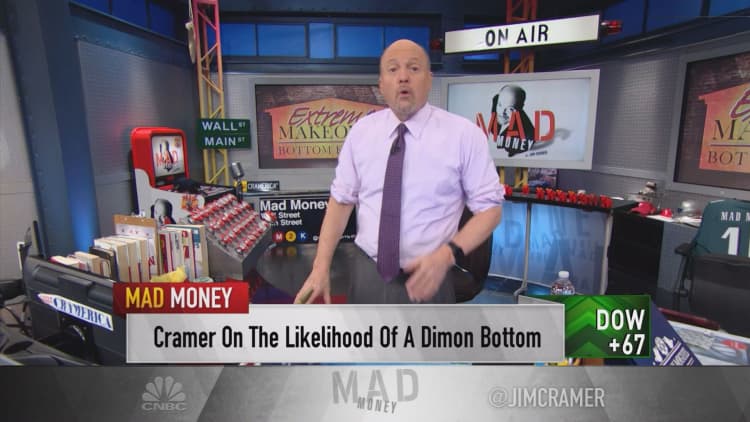
After bottoming on Feb. 11, stocks have had an enormous run in the past few weeks. What was so special about that day? It was the day JPMorgan CEO Jamie Dimon bought 500,000 shares of his company's stock.
Jim Cramer now calls this day the "Jamie Dimon bottom."
Cramer knows that Dimon did not intend to call a bottom that day, but not only is JPMorgan up more than 7 percent since then, but the Dow and have both rallied higher.
"This well-timed buy had more to do with the prevailing gloom three-and-a-half weeks ago than the actual conditions at his bank," the "Mad Money" host said.
We do know is that the Dimon bottom is looking increasingly like something very real and very positive.Jim Cramer
It was a combination of various factors that all came together to allow the averages to roar higher. Cramer drilled down on each one:
The first ingredient was oil, as investors became more nervous about the potential risks to the financial system caused by the relentless decline of crude down to $26.
This was also the week of the New Hampshire primary, and many were shocked by the resounding victory that Bernie Sanders had over Hillary Clinton.
Read more from Mad Money with Jim Cramer
Cramer Remix: What you didn't learn in school
Cramer: Untangling the IRA, 401(k) Roth mystery
Cramer: Young investor? Here's where to start
At the same time, the Fed wasn't helping matters either. Janet Yellen was testifying at the exact same time the market bottomed, and her testimony only accelerated the view that the Fed saw the weakness occurring but wasn't necessarily willing to stop its course of tightening.
This sent Treasurys soaring, as the ten-year Treasury yield fell to 1.6 percent. Cramer interpreted this as a level indicating the massive amount of fright in the system.
Cramer also started to hear reports of tremendous losses that European banks had suffered. Deutsche Bank was widely considered to be in big trouble, but Cramer found that hard to believe.
"I doubt that big bankers have an emergency hotline to each other, but in terms of timing, Jamie Dimon's brilliant buy coincided with something remarkable," Cramer said.
The very day after Dimon's purchase, on Feb. 12, Deutsche Bank confirmed that it was not in trouble and even announced a buyback of more than $5 billion in bonds. This proved that perhaps things weren't as bad as many thought.
It also turned out that $26 was the exact bottom for oil. While oil could be lower for a lot longer, many oil companies have come back to the market with equity that could give them more flexibility.
Banks may not have had strong earnings, but at least the frightening decline in their preferred shares has subsided, along with large sell-offs in real estate investment trusts and oil master limited partnerships.
When Cramer looked at all of the ingredients to the market bottom, he thinks there might be an end to the bear market that plagued stocks for months.
"We don't know for sure. But what we do know is that the Dimon bottom is looking increasingly like something very real and very positive," Cramer said.
Questions for Cramer?
Call Cramer: 1-800-743-CNBC
Want to take a deep dive into Cramer's world? Hit him up!
Mad Money Twitter - Jim Cramer Twitter - Facebook - Instagram - Vine
Questions, comments, suggestions for the "Mad Money" website? madcap@cnbc.com



